Jacques Derrida (19302004) was director of studies at the cole des hautes tudes en sciences sociales, Paris, and professor of humanities at the University of California, Irvine. He is the author of many books published by the University of Chicago Press. Jay Williams is senior managing editor of CriticalInquiry.
The University of Chicago Press, Chicago 60637
The University of Chicago Press, Ltd., London
2013 by The University of Chicago
All rights reserved. Published 2013.
Printed in the United States of America
22 21 20 19 18 17 16 15 14 13 1 2 3 4 5
ISBN-13: 978-0-226-92452-6 (cloth)
ISBN-13: 978-0-226-92454-0 (paper)
ISBN-13: 978-0-226-92455-7 (e-book)
Library of Congress Cataloging-in-Publication Data
Derrida, Jacques, author.
[Essays. Selections. English]
Signature Derrida / Jacques Derrida ; edited and with a preface by Jay Williams ; introduction by Franoise Meltzer.
pages cm.
Essays previously published in the journal Critical inquiry.
A Critical inquiry book.
ISBN 978-0-226-92452-6 (cloth : alkaline paper) ISBN 978-0-226-92454-0 (paperback : alkaline paper) ISBN 978-0-226-92455-7 (e-book)
I. Williams, Jay (James W.), editor, writer of added commentary. II. Meltzer, Franoise, writer of added commentary. III. Critical inquiry. IV. Title.
B2430.D482E5 2013
194dc23
2012044796
 This paper meets the requirements of ANSI/NISO Z39.481992 (Permanence of Paper).
This paper meets the requirements of ANSI/NISO Z39.481992 (Permanence of Paper).
Signature Derrida
Jacques Derrida
Edited with a Preface by
Jay Williams
Introduction by
Franoise Meltzer
The University of Chicago Press
Chicago and London
A Critical Inquiry Book
Contents
TRANSLATED BY AVITAL RONELL
TRANSLATED BY ALAN BASS
TRANSLATED BY PEGGY KAMUF
TRANSLATED BY PEGGY KAMUF
TRANSLATED BY PEGGY KAMUF
TRANSLATED BY PEGGY KAMUF
TRANSLATED BY GEOFFREY BENNINGTON AND RACHEL BOWLBY
TRANSLATED BY PEGGY KAMUF
TRANSLATED BY PASCALE-ANNE BRAULT AND MICHAEL NAAS
TRANSLATED BY PASCALE-ANNE BRAULT AND MICHAEL NAAS
TRANSLATED BY PASCALE-ANNE BRAULT AND MICHAEL NAAS
TRANSLATED BY LAWRENCE VENUTI
TRANSLATED BY DAVID WILLS
Preface
We are witnessing a new mode of attending to the work of Jacques Derrida. I am tempted to say era instead of mode, but periodization does not work well with reception history; different modes operate coterminously, and periodization too easily misleads us toward a supposed telos. In summing up a complicated history of four past modes of reception, though without assigning priority to any one in particular, we can say that Derridas work has been required reading; that it has been considered the instantiation of all that is wrong with the American academy and the Left; that deconstruction and Derrida together were declared dead and morally bankrupt; and that selected works were considered fundamental to our understanding of Marx, Freud, Foucault, and Husserl. But now we are witnessing a new wave of primary and secondary literature that is changing the general reception of his work: the publication of his lectures, the first of what will undoubtedly be a number of academic biographies, a journal entitled Derrida Today, and new critical work produced from a more serious intellectual topos than that of the culture wars. It is a time of rereading Derrida in order to more accurately assess his place, not in the academy or the culture at large, but in the history of philosophy and critical theory.
This volume collects major work from his entire ca reer, a sampling made possible because of his friendship and intellectual relationship with the journal Critical Inquiry and its editors, especially W. J. T. Mitchell, Arnold I. Davidson, and Franoise Meltzer. There is an emphasis on his later writings, what Meltzer in her introduction calls the work of the public intellectual who writes on a broad variety of topics. This shouldnt be surprising; after all, Critical Inquiry is not a specialized philosophical journal. We would like to think that this is why he found the journal compatible. A different genre in which he wrote specifically for Critical Inquiry, however, puts this issue of compatibility in a different light. Derrida wrote But, beyond... (Open Letter to Anne McClintock and Rob Nixon) and Biodegradables: Seven Diary Fragments at the invitation of the editors of Critical Inquiry, who had hoped he would respond to critiques, sometimes fierce, to essays he had first published in the journals pages. (The critiques may be found at http://criticalinquiry.uchicago.edu/.) These two critical responses offer the clearest public record of Derridas philosophical relationship to Critical Inquiry, one of his principal outlets in the Americas.
Time and again in these critical responses, Derrida refers to Critical Inquirys hospitality. But by calling the journal hospitable and inviting he is also calling attention to the problematic nature of being a host and of being a guest, the journal as host and the writer as guest. The host is inviting yet controlling, welcoming but exclusionary. The guest is grateful yet reluctant, proud to be selected yet suspicious of the reasons. In Biodegradables, Derrida responds at great length yet insists that Critical Inquiry urged him to do so; he would not have come if he had not been invited. One must always insist on Derridas graciousness and generosity, but his work reveals the aporias within the concepts of hospitality, the gift, and mourning (major themes that appear throughout this volume). Critical Inquiry, as host, invites critical responses to further dialogue, but it determines who responds and who has the last word. That Derrida chafes under these controls is quite obvious. But it is more than a merely personal reaction. It is the pressure he puts on the notion of hospitality that, for example, underlies the humor mixed with irritation in the following passage in Biodegradables. In these journal fragments, he is deciding whether to respond to the six critical responses: If one day I respond, could I make a bet?... A liberal journal [and the editors ask themselves, Are we really only liberal? But this is the necessary defense of the guest in face of the hosts rules.] has to accept that bets are made in its pages. All the more so since, with its liberal, pluralist concern to maintain public discussion without privileging any side (an irreproachable policy, especially if its principle could be rigorously and sincerely applied [here we have Derrida both accepting Critical Inquirys hospitality and questioning it]), this excellent publication is managed by wise men and women and responsible intellectuals [now of course the reader is wondering if indeed CI is excellent, wise, and responsible]. Thus they also knowits the logic of debates, bets, auction bids, and bidding warsthat this can serve the prosperity of the institution, I mean the promotion of the journal that is urging me to respond at a single blow to six articles at once!
Derrida goes on to consider the connection between hospitality and the archive. In Biodegradables Derrida plays with the ideas of the impermanence (one hopes) of bad thoughtas represented by five of the six critical responsesthe Heideggerian-inspired question of the remnant or remainder, and the content and nature of a written archive. As Peggy Kamuf, the translator of Biodegradables, notes, Derrida is writing here in a semiparodic or citational mode, so it is no small wonder that Derrida at one point discusses archive in the practical terms of the problems of storage for American university libraries. Derrida imagines that if, in the future, in the interests of conserving space, all of
Next page



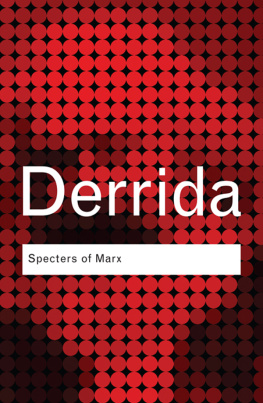

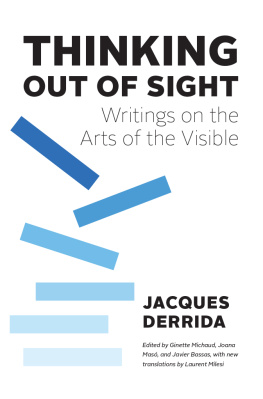
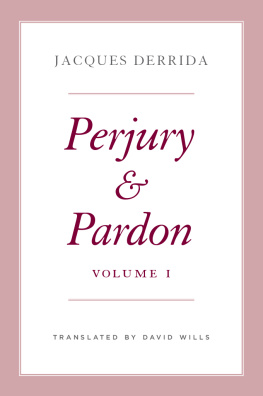
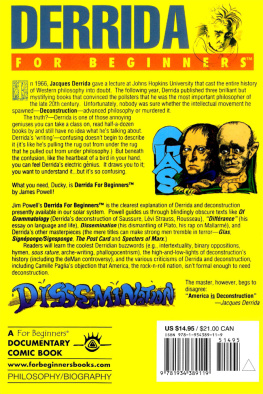
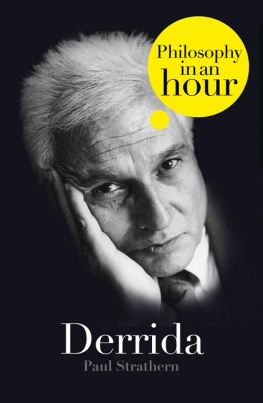
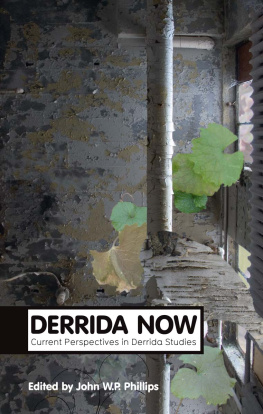
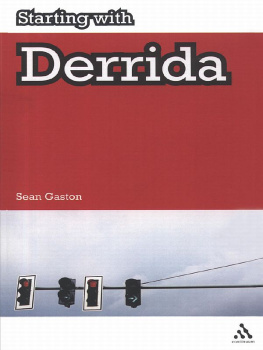
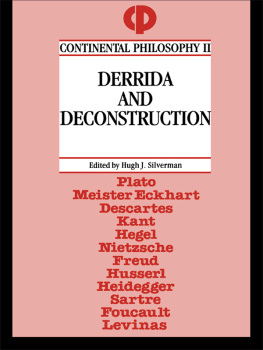
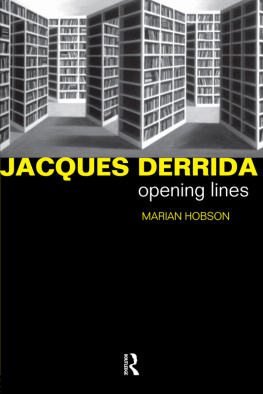

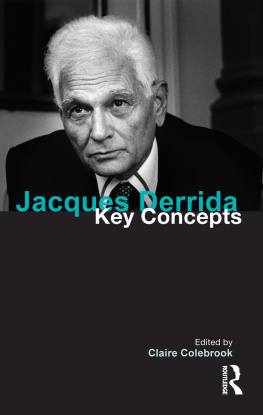
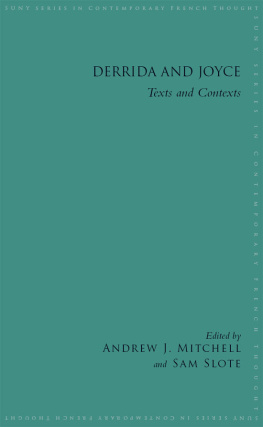
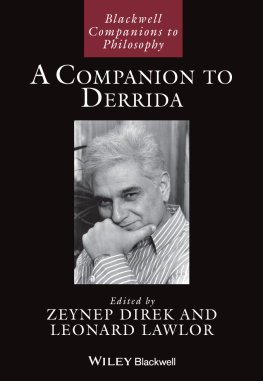
 This paper meets the requirements of ANSI/NISO Z39.481992 (Permanence of Paper).
This paper meets the requirements of ANSI/NISO Z39.481992 (Permanence of Paper).